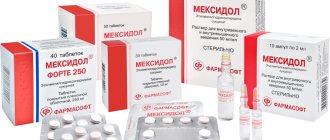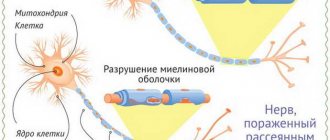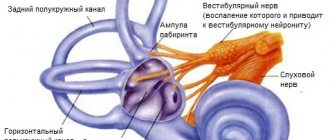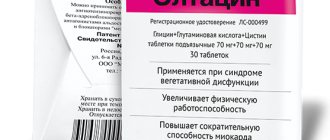Medicines for dizziness for older people are prescribed as symptomatic therapy in order to normalize general well-being.
There is an extensive list of drugs from different pharmacological groups that improve cerebral circulation and the functions of the vestibular apparatus, and have a beneficial effect on the functioning of the great vessels. Medicines in this category are prescribed only after a comprehensive examination of the central nervous system to determine the causes that provoke attacks of dizziness.
Causes of dizziness in old age
For most older people, the periodic occurrence of severe or moderate dizziness is a familiar symptom that occurs spontaneously after a sudden change in body position or physical activity. Such a state of the body is always associated with the presence of concomitant diseases of the central nervous system and blood vessels that feed brain tissue.
According to medical statistics, about 30% of men and women over 60 years of age suffer from attacks of dizziness. Modern pharmacology offers a whole list of effective medications for dizziness of various etiologies.
The appearance of this symptom is associated with the influence of the following causative factors:
- cerebrovascular disorders caused by diseases of the blood vessels that supply brain tissue;
- previous stroke;
- side effect from taking a large number of medications at the same time;
- unstable blood pressure, which is characterized by a sharp narrowing and expansion of the walls of the great vessels;
- negative changes in the structure of the vestibular system that occur due to the natural aging process;
- Parkinson's disease;
- chronic osteochondrosis of the cervical spine;
- diabetes;
- Alzheimer's disease;
- nervous tension and stressful situations;
- inflammation of the meninges caused by meningococcal infection;
- arrhythmia and other diseases of the cardiovascular system;
- cerebrovascular accident;
- poor and unbalanced nutrition, which causes an acute deficiency of vitamins and minerals necessary for the stable functioning of the central nervous system;
- hypertonic disease;
- positional paroxysmal vertigo of a benign type (in this case, pathological symptoms arise due to degenerative changes in the structure of the inner ear);
- hypotension;
- brain tumors that are benign or oncological in nature;
- atherosclerosis of blood vessels.
Determination of the above reasons that cause attacks of dizziness is carried out through a comprehensive diagnosis of the central nervous system, heart, vestibular apparatus and blood vessels. Based on the results of the study, the neuropathologist selects the drug that is advisable to take for dizziness of a specific nature.
Symptoms
Dizziness can usually be described as:
- Sensation of a feeling of movement or rotation
- Lightheadedness or feeling of fainting
- Loss of balance or instability
- Other sensations such as floating or heaviness in the head
A number of medical conditions can cause the feeling of dizziness. In some diseases, there is a disruption in the transmission of nerve impulses from one or more sensory systems to the brain, which leads to incorrect analysis of the information received. These disorders may affect the following sensory systems:
- Eyes that help determine the location of the body in space and its movement
- Sensory nerves (proprioception), which send messages to the brain about body movements and positions in space
- The inner ear, which contains sensors that help sense gravity and reciprocating motion
Some types of dizziness require immediate medical attention.
These are the following conditions accompanied by dizziness:
- Traumatic brain injury
- Sharp, severe headache
- Neck stiffness
- Blurred vision
- Severe acute hearing loss
- Speech disorders
- Weakness in a leg or arm
- Impaired consciousness
- Gait disturbance or falling
- Chest pain or heart rhythm disturbances.
Lists of effective and safe drugs for older people
Medicine for dizziness for older people (the list of medications indicated for use is compiled by the attending physician) is selected individually depending on what disease of the central nervous system or blood vessels was diagnosed in the patient.
In this case the following can be used:
- nootropic drugs;
- muscle relaxants;
- anti-inflammatory drugs;
- multivitamin complexes.
Nootropics
The main purpose of nootropic drugs is to improve cerebral circulation and central nervous system functions. The table below provides a list of the most effective and safe medications in this category.
| Name | Characteristics of the drug |
| Vinpocetine | Vinpocetine is a drug that improves metabolic processes occurring in brain tissue. The active component of this drug is the chemical vinpocetine at a dosage of 5 mg per tablet. This medication is indicated for older people who suffer from dizziness caused by vascular diseases or cerebrovascular accidents. Therapy with this drug is carried out over a continuous course with a minimum duration of at least 2 months. Vinpocetine should be taken 1-2 tablets 3 times a day. Within 1 year, you can take 2-3 treatment courses with this medication. It all depends on the type of disease and the severity of dizziness attacks. The average cost of this drug is 40 rubles. for 50 tablets |
| Glycine | Glycine is an effective and absolutely safe nootropic drug that improves blood supply to the brain and has a beneficial effect on the functions of the central nervous system. The active ingredient of this drug is microencapsulated glycine in a dosage of 100 mg per tablet. This medicine is taken 1 tablet 2 to 3 times a day with a therapeutic course duration of 2-4 weeks. The medication is taken by dissolving the tablet inside the mouth. Elderly patients with dizziness that occurred after an ischemic stroke of the brain are advised to take 1000 mg of Glycine in the first 6 hours. The tablets are dissolved at intervals of 25-30 minutes. The average cost of this medication ranges from 29 to 41 rubles. per pack of 50 tablets. |
| Piracetam | Piracetam is a nootropic drug that comes in the form of red gelatin capsules. The active substance of this medication is the chemical compound piracetam at a dosage of 400 mg. This drug is used to treat elderly patients with signs of dizziness due to vascular diseases of the brain, central nervous system pathologies, and Alzheimer's disease. At the initial stage of therapy, Piracetam is prescribed in a dosage of 2 tablets 3 times a day before meals. As the attacks of dizziness disappear, the dose of the medication is reduced to 1 tablet, which should also be taken 3 times a day. The duration of the treatment course ranges from 2 weeks to 6 months. depending on the severity of the clinical case. The average cost of this drug is 65 rubles. for 60 tablets. |
A distinctive feature of nootropic drugs is that they normalize blood supply to the brain, stabilize the functions of the central nervous system, eliminate attacks of dizziness, but at the same time they have a minimum number of side effects.
Anti-inflammatory drugs for vascular compression
Elderly patients who suffer from pathological vascular conditions are prescribed non-steroidal anti-inflammatory drugs. Medicines in this category have an antiplatelet effect, eliminate signs of the inflammatory process, and improve general blood circulation in the body.
| Drug name | Characteristics of the drug |
| Aspirin Cardio | Aspirin Cardio is a drug in tablet form, which is produced on the basis of acetylsalicylic acid. The dosage of the main component is 100 mg per tablet. This medication normalizes general blood circulation, prevents the occurrence of dizziness, which is caused by thrombosis, diseases of the heart and blood vessels. Aspirin Cardio prevents the development of cerebral stroke. The dosage regimen for this drug involves taking 1 tablet once a day for 30 minutes. before meals, with plenty of liquid. The duration of treatment is determined by the doctor. The average cost of the drug Aspirin Cardio is 73-75 rubles. for 20 tablets. |
| Lornoxicam | Lornoxicam is an effective and safe non-steroidal anti-inflammatory drug with pronounced antiplatelet properties. The active component of this drug is the substance lornoxicam at a dosage of 8 mg in 1 bottle. This medication is created for intravenous and intramuscular administration. The use of Lornoxicam is indicated in those clinical situations where the appearance of attacks of dizziness is associated with compression of the walls of the great vessels. For example, in the presence of inflammatory processes in the cervical spine, where most of the large arteries supplying brain tissue pass. The dosage regimen for the drug Lornoxicam is intramuscular or intravenous administration of 8 to 16 mg of this drug. The duration of therapy is determined individually. The average cost of this medication is 532 rubles. |
Before prescribing anti-inflammatory drugs, it is imperative to establish the causative factors, the impact of which provoked swelling of the soft tissues and compression of the walls of blood vessels. The maximum therapeutic effect to eliminate dizziness is achieved with the combined use of NSAIDs and antiplatelet drugs.
Vitamin medicines
Medicine for dizziness for older people (the list of drug therapy used during treatment is compiled by a neurologist) is used to eliminate pathological symptoms, as well as combat the underlying disease that provokes it.
In medical practice, there are periodically cases where attacks of dizziness are associated with an acute deficiency of nutrients necessary for the stable functioning of the central nervous system. The table below lists vitamin and mineral complexes that normalize the functions of the cerebral cortex.
| Drug name | Characteristics of the drug |
| Medivitan | Medivitan is an effective and safe vitamin product with a combined composition. The active components of this drug are the following substances:
Medivitan is administered into the patient's body in the form of an injection solution by installing intravenous drips or performing intramuscular injections. The therapeutic dose of this drug is 5 ml 2 times a week. The duration of treatment is 4 weeks. In total, the patient should receive 8 injections of Medivitan. The average cost of this medication is 975 rubles.
|
| Folic acid | Folic acid is a medicine prescribed to an elderly patient with signs of vitamin B9 deficiency. A lack of this substance can lead to functional disorders of the central nervous system and dizziness. This medication is available in the form of tablets, which contain 1 mg of the active substance in the form of folic acid. The dosage regimen for this drug involves taking from 1 to 5 tablets per day. The total dosage depends on the severity of the vitamin B9 deficiency and the general health of the patient. The average duration of the therapeutic course is from 25 to 30 days, and the cost of this drug ranges from 23 to 46 rubles. for 50 tablets. |
| Multi-Tabs Classic | This is a balanced multivitamin complex, which contains all the vitamins and minerals necessary for stable functioning of the central nervous system, as well as preventing attacks of dizziness. This drug is taken 1 tablet 1 time per day immediately after meals or directly during meals. The price of this medication ranges from 346 to 455 rubles. |
Taking vitamin preparations can be carried out in combination with drug therapy with other drugs, the action of which is aimed at improving the functions of the brain and vestibular apparatus.
Muscle relaxants to reduce muscle tone
Medicine for dizziness for older people (the list of drugs that normalize cerebral circulation includes muscle relaxants) is selected taking into account the general condition of the patient. The table below lists medications that weaken the tone of muscle tissue, eliminate the effect of spasm, and also have a positive effect on the functions of the central nervous system.
| Name of the medication | Characteristics of the drug |
| Baklosan | Baklosan is a centrally acting muscle relaxant used for dizziness caused by brain tumors, cerebrovascular pathologies, and multiple sclerosis. The active component of this drug is the substance baclofen with a mass fraction of 10 and 25 mg per tablet, depending on the individual needs of each patient. At the initial stage of treatment, Baklosan is taken 5 mg 3 times a day. Over the next 3 days, the dosage of this medication is increased by 5 mg until a stable therapeutic effect is achieved. In this case, the elderly patient must be under constant supervision of medical personnel. The dosage of Baklosan is selected in such a way that the effect of reducing the tone of the walls of blood vessels is achieved, but the functions of the muscular system of the musculoskeletal system are not impaired. The average cost of this medication ranges from 247 to 260 rubles. for 50 tablets.
|
| Calmirex | It is a muscle relaxant that affects the centers of the brain responsible for muscle tone. The active component of this drug is the substance tolperisone hydrochloride with a concentration of 50 mg in 1 tablet. Calmirex is prescribed for use in elderly patients who suffer from attacks of dizziness resulting from pathologies of the cerebral vessels and the consequences of a previous stroke. This medication is prescribed in a dose of 1 tablet 3 times a day after meals. Calmirex should be taken with plenty of water. It is strictly forbidden to break the tablet or damage its protective shell. During treatment, the dosage regimen for this drug can be changed to 3 tablets 3 times a day. The duration of therapy is determined by the doctor individually. Calmirex is not recommended for use by elderly patients who suffer from severe kidney disease. The average cost of this medication ranges from 210 to 214 rubles. for 30 tablets. |
Taking muscle relaxants should only be done under the supervision of the attending physician or junior medical personnel. The above drugs are considered safe, but if the dosage is incorrectly selected, side effects may develop.
Antibacterial drugs
The use of antibacterial drugs in the fight against attacks of dizziness is advisable if the cause of their occurrence is meningococcal infections, which provoked inflammation of the cerebral cortex. The table below shows medications that can stabilize the patient's condition.
| Name of the medication | Characteristics of the drug |
| Ampicillin | Ampicillin is an antibacterial agent that belongs to the pharmacological group of semisynthetic penicillins. 1 tablet of this drug contains 1 g of active substance in the form of ampicillin sodium salt. A single dose of this medication is from 250 to 500 mg, and a daily dose is from 1 to 3 g. This amount of the drug is divided into 4 doses. The average cost of Ampicillin is 26 rubles. for 20 tablets. |
| Ceftriaxone | Ceftriaxone is a cephalosporin antibiotic with a dosage of 1 g in 1 vial. The medication is available in the form of a white powder, on the basis of which an injection solution is prepared for intravenous and intramuscular administration. The dosage of this drug is 1-2 g once a day, and its price is 22 rubles. for 1 bottle. |
The prescription of antibacterial agents is carried out by an infectious disease doctor after confirming the fact of inflammation of the meninges caused by meningococcal infection. As pathogenic microorganisms are destroyed, the patient’s well-being normalizes, and signs of dizziness go away.
Treatment
Treatment for dizziness depends on the cause and symptoms.
- BPPV. Treatment for BPPV involves a simple procedure in which a doctor or physical therapist performs a head repositioning maneuver. This procedure usually begins to work after one or two treatments.
- Diseases of the inner ear. Exercises to restore the vestibular system are used to treat acute vestibular neuronitis or labyrinthitis. To provide relief from nausea and dizziness, your doctor may prescribe medications such as meclizine (Antivert) and diazepam (Valium) or may recommend dimenhydrinate (Dramamine). In some cases, a short course of corticosteroids may be prescribed, which may improve vestibular function.
- Meniere's disease. Treatment of Meniere's disease involves reducing fluid in the body through the use of diuretics or dietary adjustments (reducing salt in food). Sometimes injections are given through the eardrum or surgery may be recommended.
- Vestibular migraine. To combat dizziness associated with vestibular migraine, it is necessary to identify and eliminate attack triggers by focusing on nutrition, stress, normal sleep and adequate physical activity. Some medications may help prevent vestibular migraine attacks or make them less severe, especially when there is nausea and vomiting. You can also perform special exercises that will help make the balance system less sensitive to movement (vestibular rehabilitation).
- Anxiety disorders. In such cases, both medications and psychotherapy may be recommended.
What medications can older people take, depending on the cause of dizziness?
Medicine for dizziness for older people (the list of medications to normalize the functions of the central nervous system includes drugs from different pharmacological groups) can be taken at the time this symptom appears.
For cervical osteochondrosis
In case of signs of dizziness caused by the negative consequences of cervical osteochondrosis, elderly people can take the following medications:
- Lornoxicam;
- Diclofenac sodium;
- Celebrex.
These drugs reduce the inflammatory process in the tissues of the cervical spine and prevent compression of the great vessels that supply the brain.
With dysfunction of the vestibular apparatus
If there are dysfunctional disorders in the functioning of the vestibular apparatus, the following medications can be taken:
- Dramamine;
- Betaserc;
- Anfiven.
The above drugs help improve microcirculatory processes in the labyrinth, and also prevent degenerative changes in the vestibular apparatus.
In case of poor circulation
For elderly patients who experience dizziness caused by cerebrovascular accident, the following medications are indicated:
- Piracetam;
- Vinpocetine;
- Glycine.
These are drugs that fall under the category of nootropic drugs. Medicines in this category stimulate blood circulation, provide better nutrition to the brain, and eliminate attacks of dizziness.
After stress
An attack of dizziness caused by a stressful situation can be eliminated by taking the following types of sedatives:
- Persen;
- Dormiplant;
- Motherwort tincture.
All of the above medications are absolutely safe for the body of older people, since they are produced on the basis of extracts of medicinal plants.
For neck spasms
In case of periodic occurrence of spasms of the neck muscles, which are accompanied by dizziness, it is recommended to use the following centrally acting muscle relaxants:
- Baklosan;
- Calmirex;
- Liorezal.
Medicines of this type are prescribed only by the attending neurologist, since violation of the dosage regimen can provoke partial dysfunction of the muscles of the musculoskeletal system.
After a stroke
Elderly people who have had a stroke may take the following medications to help cope with dizziness attacks:
- Amylonosar;
Amylonosar - a medicine for dizziness for older people after a stroke - Phenylpiracetam;
- Ceregamon.
Therapy with these medications allows you to speed up the process of recovery of the central nervous system and prevent the occurrence of negative consequences and complications caused by cerebral stroke.
Medicines for dizziness for older people are available in the form of capsules, tablets coated with a protective film, as well as injection solutions for intravenous and intramuscular administration. The list of the most effective and safe medications includes nootropic drugs, muscle relaxants, and non-steroidal anti-inflammatory drugs.
Complete elimination of attacks of dizziness is possible only after identifying the cause of the pathological symptom. The average duration of a therapeutic course with drugs of the above types ranges from 2 weeks to 6 months. The dosage regimen is determined individually depending on the type of disease.










